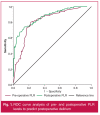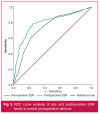The role of inflammatory parameters in the prediction of postoperative delirium in patients undergoing coronary artery bypass grafting
- PMID: 35244671
- PMCID: PMC10031851
- DOI: 10.5830/CVJA-2022-008
The role of inflammatory parameters in the prediction of postoperative delirium in patients undergoing coronary artery bypass grafting
Abstract
Objective: In this study, we aimed to evaluate the association of pre-operative and early postoperative inflammatory parameters with postoperative delirium in patients operated on for coronary artery bypass grafting.
Methods: The data of 1 279 cardiac surgery patients operated on between June 2014 and March 2020 were analysed retrospectively. Among these, 777 (61.2%) patients operated on for isolated coronary artery bypass grafting surgery with cardiopulmonary bypass were enrolled. Two groups were formed. The patients who developed postoperative delirium were placed in group 1 (n = 187) and the patients with uneventful postoperative follow up (n = 590) were enrolled in group 2.
Results: Pre- and early postoperative mean platelet volume, C-reactive protein level, erythrocyte sedimentation rate, platelet- to-lymphocyte ratio and neutrophil-to-lymphocyte ratio were elevated in group 1 (p = 0.0001). The APACHE II score and duration of hospital and intensive care unit stay were significantly elevated in group 1 (p < 0.05). An early-stage neurological event was observed in eight patients (4.3%) in group 1 and 12 patients (2%) in group 2, which was not statistically significantly different between the groups (p = 0.09). In-hospital mortality was observed in three patients (1.6%) in group 1 and five patients (0.8%) in group 2, which did not show a statistically significant difference (p > 0.05). In univariate and multivariate regression analysis, the pre-operative platelet-to-lymphocyte ratio (p = 0.013), mean platelet volume (p = 0.0001) and erythrocyte sedimentation rate (p = 0.002) were determined as independent risk factors for the occurrence of delirium in the early postoperative period. Also, the postoperative platelet-to-lymphocyte ratio (p = 0.0001), neutrophil-to-lymphocyte ratio (p = 0.0001) and erythrocyte sedimentation rate (p = 0.0001) were determined as independent risk factors for the occurrence of delirium in the early postoperative period.
Conclusions: Pre- and early postoperative inflammatory parameters were observed to be predictors of postoperative delirium in patients operated on for coronary artery bypass grafting.
Keywords: coronary artery bypass grafting surgery; delirium; inflammation.
Figures
References
-
- Wimmer-Greinnecter G, Matheis G, Breden M. Breden canfes after cardiopulmonary bypass for coronary bypass grafting. Thorac Cardiovasc Surg. 1998;46:207–212. - PubMed
-
- Şaşkın H, Ozcan KS, Duzyol C, Macika H, Aksoy R, İdiz M. An easily overlooked clinical phenomenon after coronary artery bypass graft surgery: postoperative delirium. Turk Gogus Kalp Dama. 2016;24(2):248–257.
-
- Subramaniam B, Shankar P, Shaefi S, Mueller A, O’Gara B, Banner- Goodspeed V. et al. Effect of intravenous acetaminophen vs placebo combined with propofol or dexmedetomidine on postoperative delirium among older patients following cardiac surgery: the DEXACET randomized clinical trial. J Am Med Assoc. 2019;321(7):686–696. - PMC - PubMed
MeSH terms
LinkOut - more resources
Full Text Sources
Research Materials




